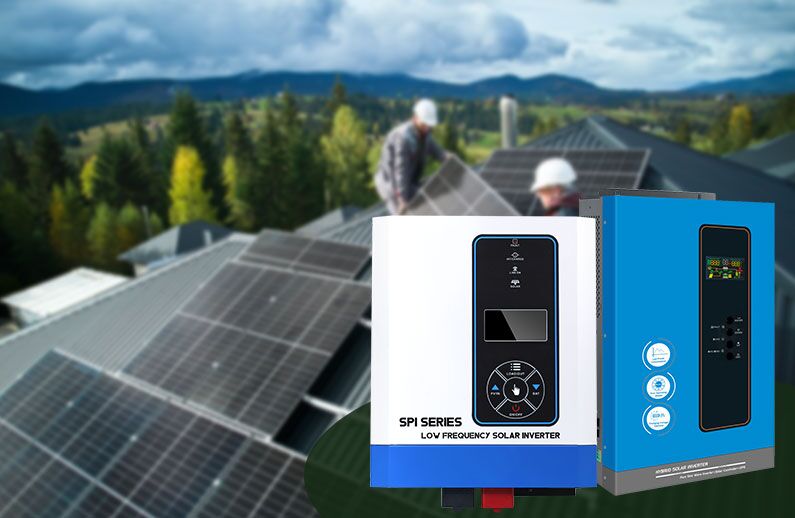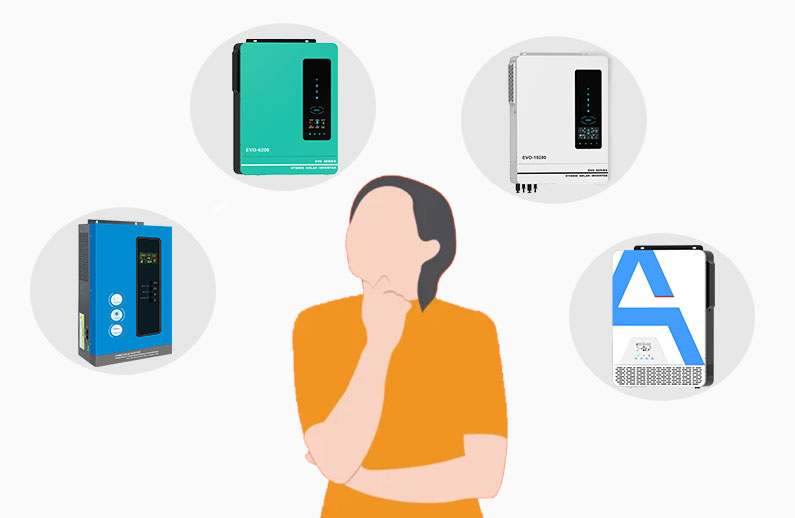How to choose the inverter that suits your needs
Dec 16, 2024
When setting up a solar power system, one of the most critical components to consider is the inverter. The inverter converts the direct current (DC) electricity generated by solar panels into alternating current (AC), which can be used by most appliances and fed into the electrical grid. Choosing the right inverter is essential for ensuring efficiency, reliability, and long-term cost savings. Let’s explore the different types of inverters and determine which is best for your needs, considering various factors and applications.
Types of Solar Inverters
1. Hybrid Inverters
Hybrid inverters can work with both solar panels and battery storage systems. They are increasingly popular as solar-plus-storage solutions gain traction.
Advantages: They simplify system design and allow energy storage for nighttime use or grid outages.
Disadvantages: Typically more expensive than traditional inverters.
For users planning to add battery storage to their solar setup, hybrid inverters are a future-proof investment.
2. Low Frequency Inverters
Low frequency inverters are rugged and designed to handle higher surge capacities, making them ideal for off-grid or industrial applications.
Advantages: High durability and the ability to power heavy-duty equipment.
Disadvantages: Bulkier and more expensive than high-frequency inverters.
For industries and rural areas, low frequency inverters provide reliable power solutions, especially for remote solar installations.
3. Central Inverters
Central inverters are designed for large-scale solar farms and commercial installations. They are similar to string inverters but can handle much higher power loads.
Advantages: Cost-effective for large systems.
Disadvantages: Limited flexibility and vulnerability to single points of failure.
Central inverters are the backbone of utility-scale solar projects.
Factors to Consider When Choosing an Inverter
System Size and ApplicationFor small to medium residential systems, string inverters or microinverters are suitable. In contrast, industrial applications often require low frequency inverters due to their ability to handle higher loads. If you're considering buying in bulk for a project, looking into wholesale solar panel inverters can be cost-effective.
Grid-Connected vs. Off-GridGrid-tied systems typically use string or hybrid inverters, while off-grid systems benefit from the robustness of low frequency inverters.
BudgetCost is a major factor. Microinverters and hybrid inverters offer advanced functionality but come at a premium. If you're sourcing inverters from suppliers offering frequency inverter china products, you may find more affordable options for various applications.
Energy OptimizationIf your installation has shading issues or panels with varying orientations, microinverters or power optimizers paired with string inverters ensure maximum energy yield.
Which is the best type?
The best type of inverter largely depends on your specific requirements. Here’s a quick breakdown to help you decide:
Residential Systems: String inverters are cost-effective, while microinverters are ideal for optimizing output in complex layouts.
Commercial Systems: Central inverters or string inverters with power optimizers are often the go-to choice.
Off-Grid Systems: Low frequency inverters provide durability and the ability to manage heavy equipment, making them ideal for remote installations.
Hybrid Systems: If you plan to include battery storage, hybrid inverters are highly recommended.
Why Source Inverters Wisely?
The inverter market is highly competitive, with suppliers from around the globe offering various products. Choosing reliable manufacturers, particularly those specializing in low frequency inverter and frequency inverter china, ensures you receive high-quality, durable, and efficient equipment. Purchasing wholesale solar panel inverters can also reduce costs for large installations or projects.
Chinese inverter manufacturers, for example, have become leaders in the solar industry due to their ability to produce affordable and technologically advanced inverters. Their inverters are known for offering exceptional value without compromising on performance, making them a smart choice for budget-conscious buyers.
Selecting the right inverter is key to maximizing the performance and reliability of your solar power system. By considering the specific needs of your project, such as system size, budget, and location, you can make an informed decision. Whether you opt for microinverters, hybrid inverters, or rugged low frequency inverters, ensuring compatibility with your solar panels and installation environment will yield the best results.
Investing in high-quality inverters from reputable suppliers, such as those offering wholesale solar panel inverters or frequency inverter china products, guarantees a system that delivers clean, reliable energy for years to come.



 Network Supported
Network Supported